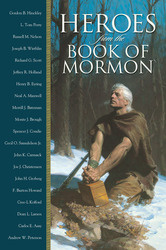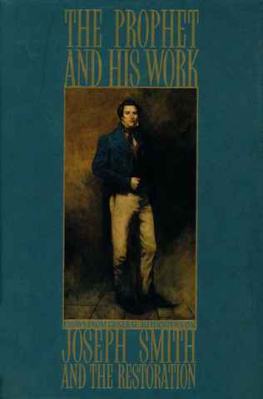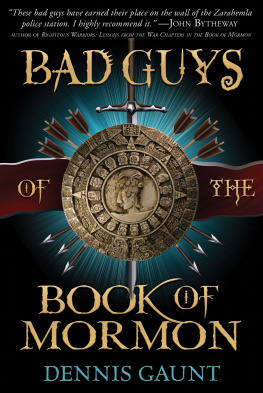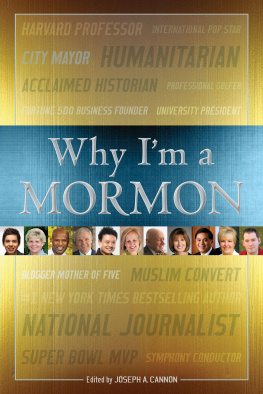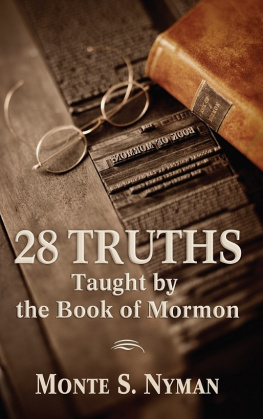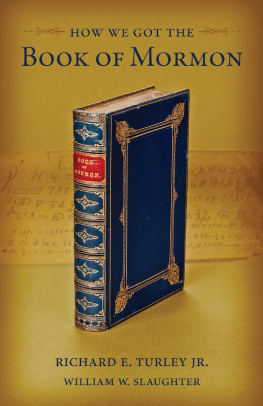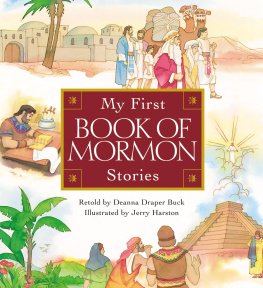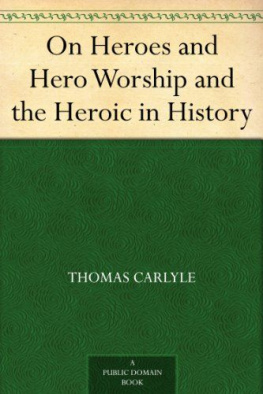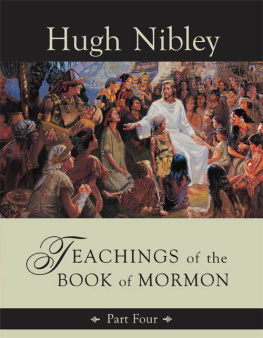Heroes from the Book of Mormon
Various Authors
2013 .
All rights reserved. No part of this book may be reproduced in any form or by any means without permission in writing from the publisher, Deseret Book Company (permissions@deseretbook.com), P.O. Box 30178, Salt Lake City Utah 84130. This work is not an official publication of The Church of Jesus Christ of Latter-day Saints. The views expressed herein are the responsibility of the author and do not necessarily represent the position of the Church or of Deseret Book. Deseret Book is a registered trademark of Deseret Book Company.
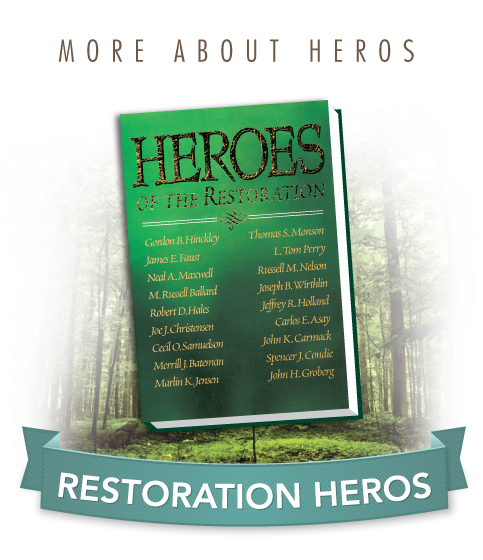
Buy the eBook now at deseretbook.com
Elder Russell M. Nelson Nephi, Son of Lehi
At first blush, it seems odd that Nephi, son of Lehi-a man born approximately 615 years b.c.-should have such a contemporary and continuing influence upon my life. But he has.
When I received my call to serve as one of the Twelve Apostles, my response included a quotation from Nephi: "I will go and do the things which the Lord hath commanded, for I know that the Lord giveth no commandments unto the children of men, save he shall prepare a way for them that they may accomplish the thing which he commandeth them" (1 Ne. 3:7). Thus, in one of the most important moments of my life, I spoke the words of a man whom I had never met, but in whom I had implicit trust. Ever since Sister Nelson and I were married, we have tried to emulate Nephi's example in accepting assignments in the Church. In that same address in which I quoted Nephi's words, I said, "I have learned not to put question marks but to use exclamation points when calls are issued through inspired channels of priesthood government" ("Call to the Holy Apostleship," Ensign, May 1984, p. 52).
Nephi had influenced my life previously through my many years as a medical educator, researcher, and surgeon. Having grown up in a day when it was not fashionable for medical doctors to participate in religious affairs, I was determined to be different. I wanted to follow the example of Nephi, who taught that we should "liken all scriptures unto us" (1 Ne. 19:23). Theconcept of blending scriptural truth with academic learning and not separating the two made perfect sense to me.
I took a great deal of courage from that concept in doing research on the heart. When I graduated from medical school, it was commonly believed that one must not touch the beating heart for fear it would stop. Because of Nephi's teachings, I chose to liken the scriptures to the field of my interest in the heart. Verses from the Doctrine and Covenants that served to undergird my thinking included:
There is a law, irrevocably decreed in heaven before the foundations of this world, upon which all blessings are predicated
And when we obtain any blessing from God, it is by obedience to that law upon which it is predicated (D&C 130:20-21).
All kingdoms have a law given;
And there are many kingdoms; for there is no space in the which there is no kingdom; and there is no kingdom in which there is no space, either a greater or a lesser kingdom.
And unto every kingdom is given a law; and unto every law there are certain bounds also and conditions. (D&C 88:36-38.)
These scriptures helped me to understand that laws pertained to all blessings, including that of the beating heart. I felt that once we understood what the laws are that keep the heart beating, we should be able to stop a damaged heart, make required repairs, and start it again. Indeed that proved to be true. Surgeons now routinely stop and start the heart, knowing that the divine laws pertaining to that blessing are dependable and incontrovertible.
During the long years of education I spent in earning two doctoral degrees, scriptures also helped me to distinguish between learning and wisdom. I am so grateful for this counsel of Nephi, quoting his brother Jacob: "O the vainness, and the frailties, and the foolishness of men! When they are learned they think they are wise, and they hearken not unto the counsel of God, for they set it aside, supposing they know of themselves, wherefore, their wisdom is foolishness and it profiteth them not. And they shall perish. But to be learned is good if they hearken unto the counsels of God." (2 Ne. 9:28-29.)
Nephi: Man of Faith and Ability
A study of Nephi's life provides inspiration as well as information. To me, it is highly significant that his first scriptural statement compliments his parents, Lehi and Sariah (see 1 Ne. 1:1). A sign of greatness then and now is the expression of deferential honor to parents. Lehi and Sariah's family of sons-Laman, Lemuel, Sam, Nephi, Jacob, and Joseph-and unnamed daughters are familiar to readers of the Book of Mormon (see 2 Ne. 5:6). Though Laman and Lemuel often resisted their father's counsel, most of Lehi's children honored him and followed his direction. Foremost among them was Nephi. Nephi's trials in obtaining the plates of Laban are a case in point.
Father Lehi responded to divine instruction by removing his family from the land of Jerusalem. The group traveled south into the wilderness adjacent to the Red Sea. Lehi was told that if he and his family remained obedient, they would be led to a land "choice above all other lands" (1 Ne. 2:20; 2 Ne. 1:5)-but to preserve their faith, they needed to have the scriptures with them. So Lehi, under inspiration, sent his sons back to Jerusalem to obtain from Laban valuable records written on brass plates that contained both the sacred scriptures and the genealogy of Lehi and his ancestors. After a great deal of trouble, the plates were obtained. Laban's servant Zoram joined with the Nephites; the sword of Laban, a weapon of superior craftsmanship, was brought back to Lehi.
As Latter-day Saints, we know that story well. But we are less familiar with the terrain and climate of that area. Sister Nelson and I have visited Israel a number of times. When sojourning in its southern sector, we have traveled in the comfort of an air-conditioned vehicle-a must for us in that very hot desert area. After an hour or two under the merciless rays of the midday sun, we have eagerly sought a cold drink or an early return to air-conditioned accommodations.
Although the place where Lehi issued the request for his sons to return to Jerusalem is not known exactly, we do know that it was along the eastern shore of the Red Sea. The distance they would have traveled-each way-has been estimated to be at least 250 miles. That is a long way to go without roads, cars, cold drinks, or air-conditioning. No wonder Laman and Lemuel murmured (see 1 Ne. 3:5). No wonder their mother complained (see 1 Ne. 5:2-3). But Nephi said, "I will go and do " A similar response was rephrased on another occasion when he said, "If it so be that the children of men keep the commandments of God he doth nourish them, and strengthen them, and provide means whereby they can accomplish the thing which he has commanded them" (1 Ne. 17:3). When Lehi asked his sons to return to Jerusalem a second time, their trek through the hot desert country would also have been without the benefit of the creature comforts to which we are accustomed. I deeply respect the faith of Nephi, whose "I will go and do" statement we quote so freely. Those words bear profound meaning for me.
The depth of Nephi's determination to follow inspired counsel is again revealed in a statement made later: "If God had commanded me to do all things I could do them. If he should command me that I should say unto this water, be thou earth, it should be earth; and if I should say it, it would be done." (1 Ne. 17:50.) That kind of faith made Nephi fearless.

